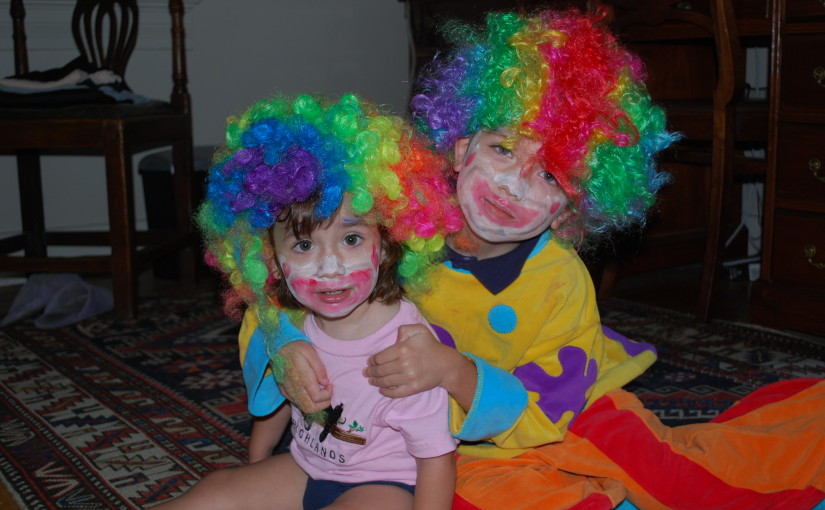7 Lessons a Parent Learns from Potty Training
After ten years raising my children, I’m returning to work in the same spot I started: the bathroom. In my first job, any potty-related referrals trickled down to the lowest psychologist on the totem pole: me. Later, I got into the complexities of diagnosis, consultation, and intervention. Then I had my own son and daughter, and there ended my ability to keep a straight face when using the words “parent” and “expert” in the same sentence.
Potty training shouldn’t be shunted to the office newbie. It’s an important chance for a parent to take on a teaching role. And your child’s responses might teach you something in return.
1. It’s your child’s accomplishment, not yours.
Not all children are eager to please at all times. Potty training can be the first time you have to support self-motivation over parent-pleasing or compliance. You’ll need to do this over and over when your child learns skills you expect him to carry out of the home, like manners and tidiness. Kids love to hear, “I’m so proud of you.” But, “You got this” is even more powerful, and not just because they say it on YouTube.
2. Learning is about successive approximations.
The hardest part of potty training my own kids was letting them make mistakes. A skinned knee is one thing, but poop on the rug is quite another. This year, my daughter learned to play team volleyball. The shortest player on the team, she spent the whole season getting her serve closer and closer to the net. Psychologists call these “successive approximations.” At the last game, the crowd went wild when she finally made it over. Parents feel the same way when a child becomes independent with the potty. But first, they have some approximations to clean up. Think of them as part of the process.
3. The journey is more important than the destination.
Potty training is a metaphorical journey. Your child will learn from her mistakes, yes, but also from your response to those mistakes. Do you stay calm, take a step back, and problem solve as a team? “Oops! What just happened? I turned on the tub, and you peed on the floor. Hearing water makes you have to pee!” You’ll do this again later, with household chores: “Oops! Your favorite jersey is under your bed! Maybe that’s why it didn’t make it into the washing machine!” If you focus too much on the destination, it’s all: “Why can’t you ever put your laundry where it goes?” and, “Stop peeing on the floor!”
4. Learners need to test the limits.
How do kids learn how full a bladder can get before it bursts? Accidents. I’m flashing back to a tall geyser in the check-out line at Rouses. But you know what? They were lovely about it. Remember that everyone you’ll see pushing a grocery cart has been potty trained at some point.
5. Skills can be broken into sub-skills.
Potty training draws on multiple developmental skills your child is in the process of acquiring, each child at her own pace and in her own way. As she’s learning, look beyond complex skills to their simpler building blocks. Certain sub-skills will stand out as strengths or weaknesses for your child.
- sensory: to recognize when she has to go
- attention: to drop one activity for another
- social: to motivate her to avoid accidents
- language: if she needs direction to the potty
- gross motor: to get from the playroom to the bathroom
- fine motor: to pull the pants down
- motor coordination: to control the stream
- persistence: to follow through from peeing to wiping to getting dressed
- anxiety management: to cope with variations in bathrooms
- planning ahead: to stay dry on the road
6. Readiness is important, but not always essential.
I really tried to wait for my son to be ready. But as he approached age three, diapers limited his school options. I knew I’d need several weeks with no travel or other major disruptions. So he started potty training with his motor skills still inadequate, and with absolutely no interest in big boy underwear. And he still succeeded. I’ve had to think creatively when teaching other skills — like using a house key — as his motor skills continued to develop slowly.
7. Toddlers seek conflict. Parents don’t have to deliver it.
Personality is the X-factor in toileting readiness. If your child likes to be in control, to surprise you, and to do things “her way,” toilet training will become an intense social interaction rather than a developmental milestone. Focus on her accomplishments, not your reactions: “I bet those dry pants feel great!” The same will work later with math homework: “Wow. How good does it feel to get all those math problems done before dinner?” It’s not a chance for her to test your patience, but rather to exercise her skills. As independently as possible.
There are many “right” ways to potty train. No matter how exciting the process turns out to be, your child will learn how the two of you are going to work together in the years ahead.
Potty Training Resources:
Books:
Everyone Poops by Taro Gomi
Potty Time! by Caroline Jayne Church
Oh Crap! Potty Training: Everything Modern Parents Need to Know to Do It Once and Do It Right by Jamie Glowacki
Toilet Training Without Tantrums by John Rosemond
